Text
I've seen a few breakdowns on Yamada's reaction to Aoyama and the traitor forgiveness/redemption response and I think I've got a decent summary here. (This includes Aizawa's reaction to).
Yes we see Yamada is clearly protective, that much is absolutely clear without a doubt. A lot of people have kinda summarized it up to being just the way Yamada is.

But I've clicked that it's something further than that, this is not just Yamada's personality rising to the surface in these panels. This is where we involve Aizawa and his response. Because although Aizawa's response is still in a realm of possible responses within his character, isn't it a little, odd, to say the least, that Aizawa appears to approach it so lightly and so supportive initially at all?
Remeber that other post I did, about parallels of Izukus actions to Aizawa's?
These panels look familiar? (My post had the Japanese for Izuku cuz English hadn't dropped yet)

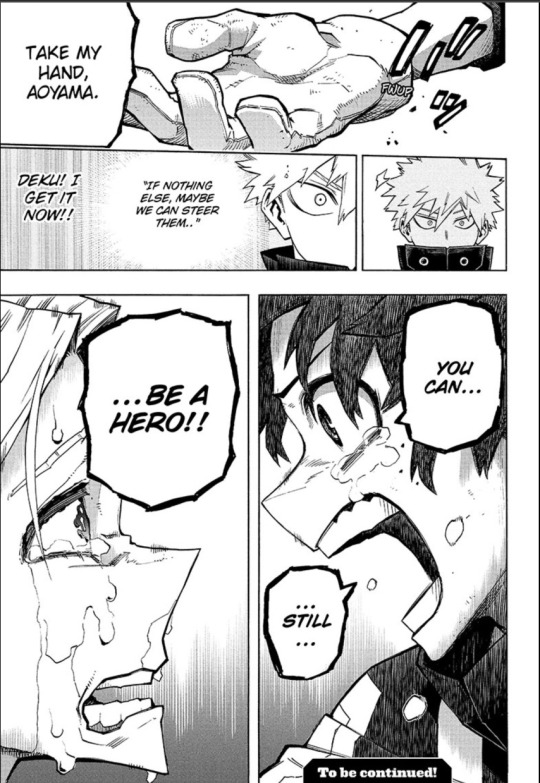
What were seeing is both Yamada's and Aizawa's trauma being reflected and their responses are directly tied to the Shirakumo/Kurogiri discovery.
Think about Yamada's position: he saw Aizawa struggle for years mourning Shirakumo's death, unable to do anything and knowing their relationship Aizawa absolutely shutting Yamada out from talking about his own pain from it. Aizawa took it and channeled it into avoidance and unhealthy, self destructive outlets, and I got a feeling Yamada at more than one point tried to talk about his feeling and Aizawa responded negatively (because he didn't want to address it). So Yamada bottled it up, he pushed it down, he put on a smile and pretended he was okay and decided to be there for his friend who - while outwardly was clearly showing signs of coping poorly - internally had chosen to attempt to ignore the pain at all costs.
Now Yamada has lost Kayama, he almost lost Aizawa a second time, and he's lost Shirakumo. And now he has seen these kids have been put at risk of losing each other (and experiencing the same pain him and Aizawa did) because of Aoyama's position. He saw how Kurogiri upset Aizawa, he saw how that has been a huge catalyst in how they responded to the Jaku raid. Now Yamada is seeing another child used by AFO and his first instinct is "not another shirakumo, not another kurogiri, not the same fate for these kids" and he jumps to this logic.

He sees Aizawa in these kids right now. He sees his own friend who was hurt, and traumatized, and has been near death twice now, and he can't bare the idea of seeing it happen again. His response comes from wanting to shield and avoid to keep them safe (much like he has with his own trauma and pain).
Then we have Aizawa: Who responds in the exact opposite.

Where Yamada sees Aizawa representing the kids, Aizawa sees Aoyama representing Shirakumo/Kurogiri. He sees an innocent, someone the class considered a friend, being taken and corrupted by AFO and Aizawa is responding to the upset he had seeing his own friend who is too far gone to save. (Supposedly, as Aizawa has said he talks to him everyday, regardless of that belief). Now Aizawa is seeing Shirakumo in Aoyama, but seeing him before he became Kurogiri. Aizawa sees Izuku doing the same thing he did with Kurogiri but with one substantial difference.
Aizawa sees that Aoyama can almost without a doubt be saved.
He's trying to save Shirakumo by saving Aoyama, by helping Izuku and his class do what he himself could not do for his own classmate.
Yamada quite possibly sees that, based on his reaction to Aizawa's support, but while Yamada is focusing his trauma into preserving the present, Aizawa is focusing his trauma on re-doing the past.
Both their responses to Aoyama are directly tied to their trauma with Shirakumo. So I have a very good feeling this will be brought up again in coming chapters.
1K notes
·
View notes
Text
It’s truly tragic that Aoyama’s parents were so scared of him… going through what Izuku did, that they resorted to such drastic measures. And tbh, what Izuku went through is still messing him up a bit even now, to the point that his bestie almost can’t even let him out of his sight anymore, so my take away from this is Aomaman and Aopapa were acting like super helicopter parents. Doing whatever they could to safeguard Aoyama’s development.

I’m a little suspicious this might have been a decision somewhat made for themselves, though. That a part of them didn’t want to deal with the future that awaited, so they decided for him, framing it to him like it was all for his sake or that it was the only way for him to fit in with society.
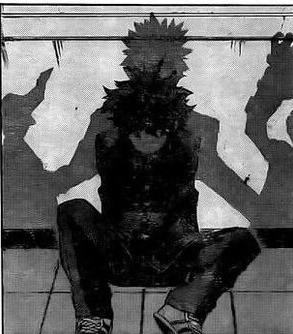
After all, Izuku went through all of elementary and middle school suffering antagonism and rejection from classmates, from teachers, and worst of all, from the hands of his best friend. That’s probably why Inko cried for him so hard and became stressed. She knew the tough future he was going to face and felt such helplessness from it all.

But you know what? Her radiant bundle of sunshine boy came out the other side so beautifully, after such a long and trying time, because Inko made damn sure to pour so much love into her quirkless Izuku as he grew up and suffered those hardships.
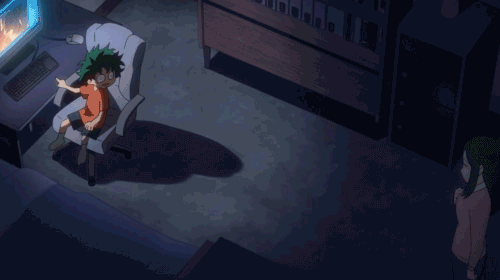
Yet facing the same situation and feelings as Inko, Aomaman and Aopapa weren’t able to accept their son just as he was and came to their own conclusions on what to do about it, without considering repercussions.
Keep reading
253 notes
·
View notes
Note
what do you think of the aoyama reveal? tbh i really like it, it makes a lot of sense, and i cant say I dont enjoy the new deku parallels and as weird as it is, the fact that aoyama of all characters now has shigaraki parallels
I was initially grumpy, but that has more to do with IRL stuff than how I actually feel lol.
I am pleased with it narrative-wise overall, though less okay with how it was bait/switch revealed (it's deliberately baiting fans with a popular fan theory just... for the sake of it, and that’s annoying). I admit I also kind of groaned because I know people will take it to mean Dabi's "save the cat" wasn't real, but upon basic reading that's just not true, yet... fandom gonna fandom.
But! Onto the narrative!
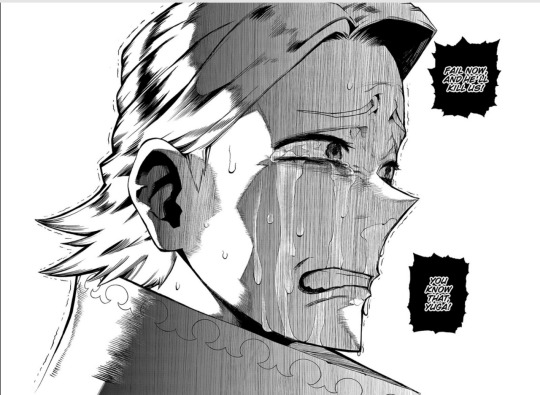
Narratively, it emphasizes the motif of parents manipulating and hurting their children. Honestly, this is the most likely way for Deku's dad to make an appearance in the story--as I've said, should he be mentioned and be relevant, it would almost certainly be with the reveal that he was embarrassed about a son without a quirk (not Dad for One lol).
What I think is a more interesting twist on Deku’s father is if the man couldn’t cope with having a son who was quirkless and de facto abandoned him, albeit perhaps through a societally acceptable reason such as a job transfer or something (culturally it’s also not that unusual for a father to take work in another city/even country and live apart from a family). If this is the case, it could actually be used to make Deku question himself and his father’s/society’s estimation of worth.
Aoyama's parents seem more bothered by him not having a quirk than Aoyama.
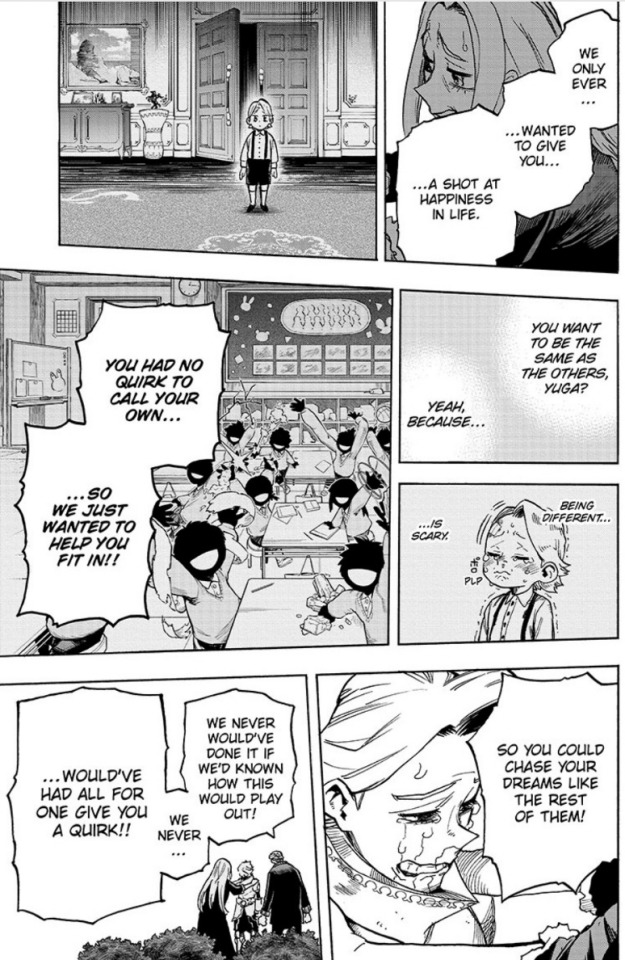
But the point is, despite Aoyama calling himself a villain, he's clearly not. He is terrified and trying to save the people he loves. He doesn’t want to be a villain at all. He wants to help people.
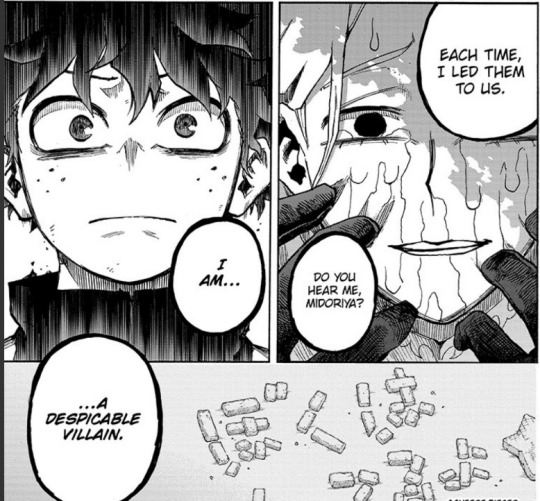
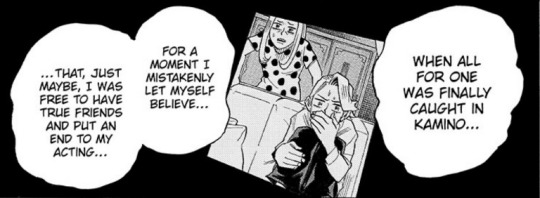
Let’s look at the training camp attack again in a new light.
Dabi sparing him takes on even more meaning now that we know Aoyama ended up in this predicament because he wasn't good enough as he was for his parents;
His cowering during the raid was guilt and fear of himself as well;
His attempt to save Bakugou and Tokoyami from abduction anyways makes him the single bravest character in the entire manga. Contrary to how he thinks of it, he tried to save his friends despite the threat of his parents' lives, despite knowing a lot of it was his fault for leaking information, etc. That's heroic.
Aoyama will be okay. The rest of Class 1A has to be motivated to save villains too. Enter Aoyama. If Horikoshi wants to, he could even use Aoyama to reemphasize the fact that these villains were all abandoned or abused by their parents, and that someone else stepped in and groomed them in their stead. Which could provoke Enji to actually face himself and do what he promised Shouto he would: lay it all on the line to save his son.
674 notes
·
View notes
Text
“A hero, out there”
I’d like to point out just two small things from the leaks, which by force majeur are probably coming a full cycle, if not soon at least in the end.
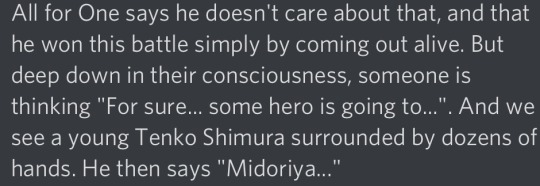
First, Shimura Tenko, deep down telling himself, almost trying to convince himself that “some hero is going to..” - but what is some hero going actually to? and just some hero? I think that there is a great difference between ‘some hero’ as in generally meant to indicate pro-heroes and ‘some hero’ that is implied here: once again, the “Midoriya” afterwards just checks it out - but here, what Tenko is trying to get at is not that there might be a hero that wants to protect and save him, but that IF there is a hero out there FOR SURE that still has the will to protect and save, then it has to be Midoriya Izuku. And it is heartbreaking, because Shimura Tenko stopped believing in heroes a long time ago.
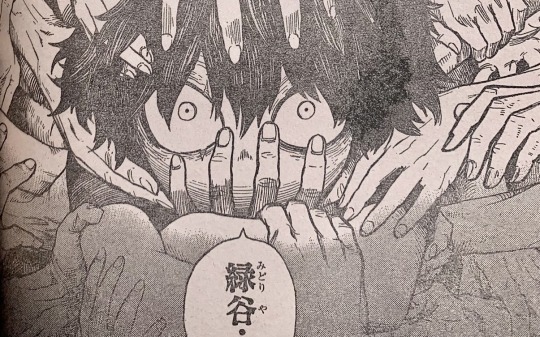
He just stopped believing that anyone, apart from AfO, might want to save him - because no hero would want to save him; and if believing in a hero (like he did with All Might) brings him to be disappointed, wandering the streets and wondering why is no one giving him a hand then it is clear that not only what Tenko is doing here is a big leap of faith, but also the utter confirmation that Midoriya is deeply different from the heroes that populate Japan at the moment.
To himself, Tenko is admitting two things: he wants to be saved; the person who might as well save him is Midoriya (better explained in this wonderful post by @/haleigh-sloth). And of course, this development has been likely triggered by what we see in chapter 305 once again, where we do have a one-sided will from Izuku to save Tenko; a promise from one suffering kid to another, where maybe instead of growing up to be fighting, they grew up holding hands and being safe.


The second thing, is that maybe, in this moment, what Shigaraki sees as ‘saving’ is synonym of destroying his joint identity with AfO, because it poses an infinite danger to Japan and the world, which is why when he tells “A hero certaintly will..” it might also mean that Tenko believes that in order to save and protect, Midoriya will put an end to ShigarAfo.

It does not mean kill or destroy - but in this moment, where hate is probably the only fuel Shigaraki knows, he likely does not have the luxury to trust someone to save him, because as already mentioned, that train has departed a long ago and while Shigaraki might believe in Midoriya, it does not necessarily mean it in the way Izuku himself does. But yet again, this also implies that Tomura/Tenko’s identity exists and that it is still fighting in order not to be overtaken by AfO. (For a moment, I thought that Shigaraki maybe sees this as playing out like: he finally gets merges with AfO right before Midoriya destroy him, so he ensures that both of them are gone and that a hero has saved him from (becoming) AfO and from himself). And he knows that Midoriya knows it to, which is why, again, Shigaraki might believe that there is a hero out there, for him.
84 notes
·
View notes
Text
on star & stripes and misogyny
tbh Horikoshi probably thought he was being progressive and inclusive by giving both the strongest quirk in the world and the #1 American hero title to a woman, but his track record of mutilating his women characters (Lady Nagant, Big Sis Magne, Midnight, Miruko, etc) and/or sidelining them (Ochako, Momo, etc) detracts from the impact this was supposed to have and instead adds to the long list of internalized misogynistic elements in his work. In this essay I will
Lol. No, really though. Star and Stripes served the narrative purpose she was created for. To the citizens of the bnha-verse she was the person that was supposed to beat the ultimate evil and make everything okay in a “well, if she can’t do it, no one can” type of way. BUT, Horikoshi introduced her with the purpose of her failing. She was never supposed to win. Why? Because a story needs a challenge to stay interesting. The stakes need to be raised for the heroes, and their fighting abilities, strengths, resilience, morals, and determination need to be tested (“how are we ever going to win now?!?!”).
Like, now that Star is probably dead, the heroes will have to go SUPER DUPER PLUS ULTRA!!! to save the day. AFO/Shigaraki taking that powerful quirk away from the strongest hero in the world is supposed to be terrifying for the people in BNHA and is supposed to stir suspense in the readers. AFO/Shigaraki are OP now. That’s the whole point fo introducing Star & Stripe. Things will get worse for the heroes (and Shigaraki) before it gets better, which is a steady and slow progression that’s been present since the war arc: there’s mass chaos and lawlessness, hopelessness, confusion, less heroes, more villains…
What I’m trying to say is basically, Horikoshi utilized Star & Stipes well (not saying it was perfect) but his track record of killing his female characters makes his handling of her and her sacrifice feel like a repeat of all the other female heroes that have died. It speaks volumes that as soon as she appeared, the readers knew she was going to die and are disappointed but not surprised. She’s a woman with has a god-tier quirk but still succumbs to the power of a man. Like I said, this wouldn’t be such a let down if that track record of mutilating women didn’t exist.
606 notes
·
View notes
Note
Was Horikoshi really trying to frame Touya as the root of the problems in the hospital chapters? I don't know if it's just me but I didn't feel that way or that Endeavour was being made to look like "helpless dad who tried his best" - at the end Natsuo even says that Enji is the root cause of all of this, and no one in the family blames Touya for his behaviour as a child (which they really shouldn't).
I hope I didn't come off as argumentative, I just wanted to know why you think that Touya was being set up like that.
I don't think that the point of those chapters was to make Endvr appear blameless, either, but Endvr's framing in them is pretty messy imho.
If you look at the flashback chapters, his actions are depicted with no saving grace. Yes, he's depicted as a man whose obsession is spiralling further and further, but the story is clear that he's no sympathetic character because of it. Rei's growing terror, the raw fear on Fuyumi and Natsuo's faces as they cower while Endvr yells at Rei the next room over, Touya's spiralling mental health, Shouto's tears as he gets between his mother and the man who just hit her... yeah no, Endvr is never depicted as a "helpless dad" at all. He's very clearly written as the one directly harming his family.
The problem is that the hospital chapters immediately after don't match that framing at all. They actually backpedal on it. After revealing the full extent of Endvr's neglect and abuse, Horikoshi failed to hold him accountable for it. Instead of making the todofam demand he own up to having pushed Touya into villainy to get his attention, they simply... entrust "stopping" Touya onto him. Not even "saving", but "stopping". The emphasis is always on how Touya is causing problems for them, instead of, you know, actually blaming the child abuser and wife beater who's really guilty of destroying their family.
Horikoshi could've easily written the same thing without all the implicit victim-blaming and scapegoating. He could've made Endvr realize that Dabi's actions as a villain are Dabi's to bear, and of course they need stopping, but Endvr could've also recognized that his son wouldn't have become a villain in the first place if Endvr hadn't abandoned him as a child and committed to making Touya a hero. There was none of that, though. Never once does he say "I treated him unfairly"; it's always "I couldn't look at him". It's guilt, but not an admission of his errors. Apologizing implies understanding and acknowledging why your actions were wrong. Endvr never does; he simply cries over them, and neither the narrative nor his family ever call him out on it. In fact, both reinforce the idea that Touya is just a plot device. Not a victim whose words always went unheard despite their truth, but Endvr's redemption token. If Endvr brings Touya back, his wrong will magically be "fixed."
Incidentally, that's why a lot of readers accept far more easily that Shigaraki will be saved but don't extend the same thinking to Dabi; Dabi isn't given sympathy by the narrative itself, who caters a lot more to Endvr's need to prove he's better now than easing Touya's trauma
75 notes
·
View notes
Text

I knew this Shigaraki panel looked familiar for a reason, and surely enough, it parallels Eri

Hori's never been particularly subtle about introducing Eri as foreshadowing of Shigaraki's eventual salvation, but the foiling here is really neat. Chisaki raised Eri to believe her existence is cursed because her quirk is monstrous and can only hurt others; AFO raised Tenko to believe he is a symbol of terror who lusts after blood, and that his quirk can only destroy.

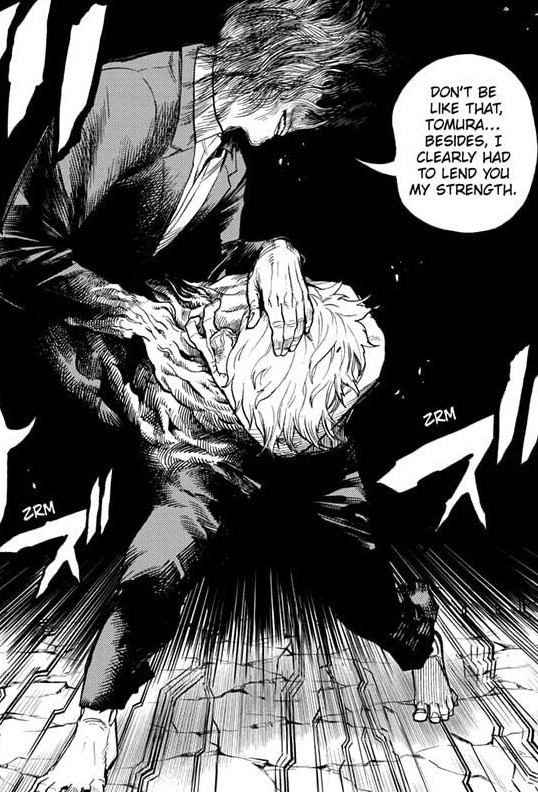
yet, both of those things were just grooming. Their abusers used those claims to keep their victim docile. And indeed, Eri only ever get freed from the shadow of Chisaki's abuse when she started smiling, aka living a life devoid of suffering.


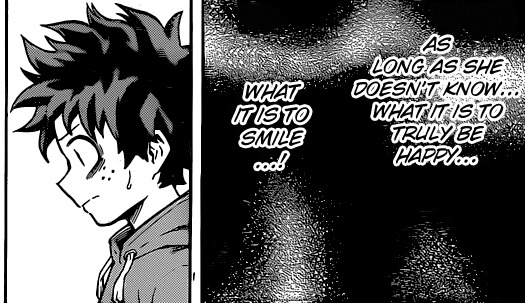
Similarly, Shigaraki has never really known freedom from his suffering, and his hatred is exactly what enables AFO's continued possession of his body:

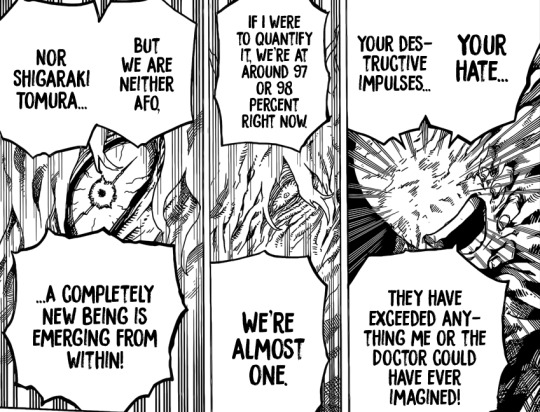
What does this all mean? Well, it's obvious, isn't it? For Eri, true freedom from her abuser had to pass through that smile — a smile that means she's finally starting to live her life to the fullest, feeling genuine joy for the first time despite Chisaki's claims that she can only know pain.

Only then, did Chisaki's shadow that had her in his clutches fully vanish.
In other words, what the parallel here shows us is that to break free from the possession, from AFO's clutches, Shigaraki needs to learn how to feel positive emotions as well, cause the hatred only makes the shadow stronger
372 notes
·
View notes
Text
The Star Guy
The three stars on top of this civilian’s hair is symbolic. Not only do these stars leave an impression and allow the readers to remember him later on in the series, but as stated in a previous meta: stars in bnha and other pieces of media, represent hope, destiny and ironically going against fate. This civilian was the first one to support/believe in Deku’s ability to become an amazing pro hero, despite knowing him briefly in the beginning. The fact that even stated that Deku would one day become a pro hero, can also be taken as choric character as Deku later becomes a hero..

Later in the series, he even stands up for Deku and is one of the few civilians to believe in him and his intentions, again providing hope and inspiration, just like a star guiding lost souls in a dark night/time.

His existence implies that there is hope for civilians changing and that not every one of them would push the blame onto Deku.
45 notes
·
View notes
Text
Isn’t it funny to notice how Tomura is so perceptive of other people, and observant of their Quirks (exactly like Izuku is), that he, even though he is unsure of who himself is, still understands that what Star and Stripe lacks is not power but rather understanding of the perception of identity? This, in turn, means that Star and Stripe, contrary to what Izuku is trying to do (which is interesting to note again: as Izuku is associated more and more villainy traits rather than taking up on traditionally hero-associated ones) does not seek to understand who the villains might be and why their identity has been shaped as that of villains and instead just focuses on her own perception of reality and on how SHE sees the target?
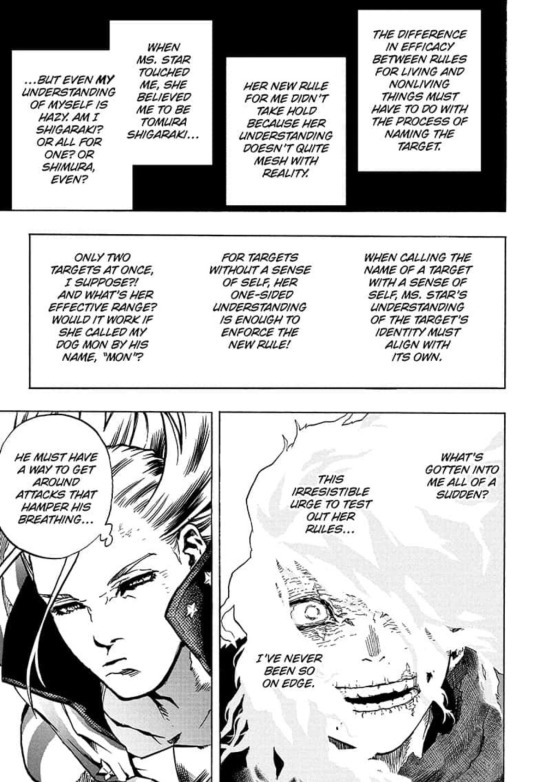
It feels like a slap on the face, which is telling us loud and clear that Star and Stripe, cares about using her ‘Special Authority’ when she can in order to eliminate the world threat that Tomura has become. It feels like we went back a step, or twenty, in both the understanding of the villains AND the ways in order to deal with them. Just once again to fortify the knowledge that what heroes do lack, in this age where heroism is everything, is humanity.
119 notes
·
View notes
Note
What do you think of the poster that appears in BNHA chapter 329 "The tragedy of Himiko Toga will keep repeating itself"?
Hi! So, I think that is pretty clear foreshadowing, actually. But, it is not foretelling.
For starters, it's an obvious callback to Curious and her understanding of Toga Himiko (side note: Horikoshi did not seem thrilled with the adaptation of My Villain Academia in the anime given the sudden references to it in the manga). I wrote a bit about this here, in which I predicted that Himiko's narrative would be about overcoming Curious's assumptions about her.
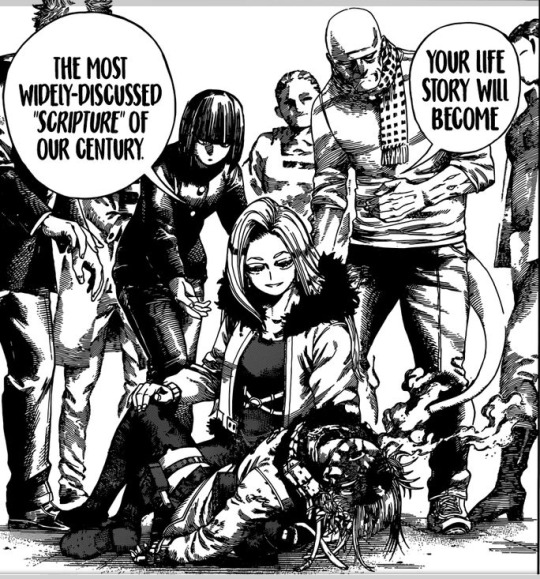
Curious's assumptions about Toga are twofold:
1) that she's a cautionary tale, and
2) she's a child who cannot tell her own story.
The first one is that Curious has told Toga she knows how Toga's story ends. Except... Curious didn't know that she was going to be the one to die that day, not Toga.

Curious also failed to see Toga as a person, instead seeing her as a symbol. See: the above image, with Curious holding Toga in the classical Pieta position, which originates in popularity from a statue by Michelangelo of Mary holding her son, Jesus.
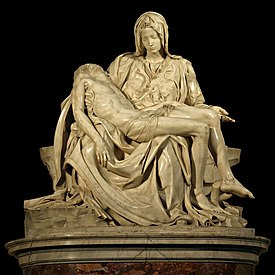
By Horikoshi invoking this imagery, he's showing that Curious firstly views Toga as a child, but also that Curious views Toga as a statue, as a symbol, as an object. Which she also blatantly states:

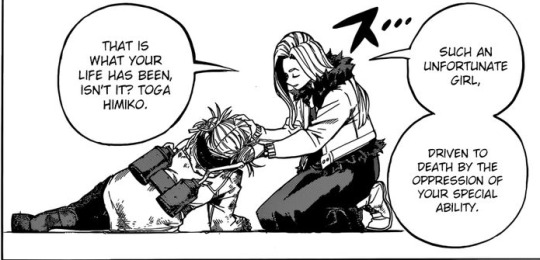
"You're the embodiment" is exactly Toga's problem, too. Toga is not a symbol or a cautionary tale; she's a person. That's a recurring motif in her arc. That's what she wanted to ask Ochaco. Also, Toga sees herself as embodying others--although she wants to be a person, she struggles to see herself that way, too.
Curious takes charge of Toga's story, wanting to be the one to use her as a cautionary tale. Having Toga die as a tragedy doesn't work at all for the story (why would it want to say Curious was right?) But it is the one society is going to try to apply to Toga.

The challenge is for Ochaco to see beyond that narrative and to see Toga Himiko, the person. It's, after all, what Toga wants.
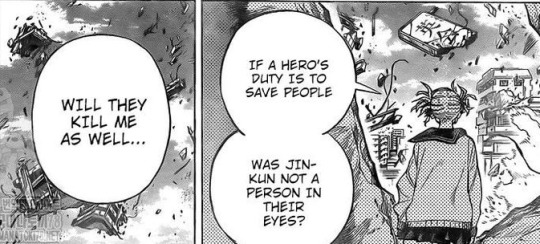
The latter is about self-actualization, the end goal of many coming-of-age stories. Toga needs to self-actualize, ie see herself as a person instead of trying to become others. That also means growing up (removing herself from the pieta position Curious has her in) and taking responsibility (oh look, a shout out to what Ochaco challenged Toga to do).

I know Ochaco was speaking in terms of Toga taking responsibility for her villainous actions/hurting people, but it also works for Toga taking charge of her own story.
142 notes
·
View notes
Text

It's All About All Might
This week's chapter we have a reminder of Shigaraki's grudge against All Might, something he has not mentioned since the training camp arc after having already caused All Might's retirement. Of course I'm not the first person to notice that Shigaraki is talking about All Might again or point it ou, but I can talk about what that means, or rather what that symbolizes.
There's symbolism in Star being just another All Might Ripoff, and yet another person who was saved by All Might when Shigaraki wasn't. In that All Might can symbolize completely different things to different people. For some people he can represent the safety and reassurance that they will always be saved, a true symbol of peace, and for others he's nothing more than a symbol of violence.
This isn't just true for the villains that All Might beats down however, it's also true for other heroes. For example, stars and stripes, cough cough cough. We have yet another example of a hero who says they were inspired by All Might to take up his legacy and become the new symbol of peace, only then to go on and immediately brutalize Shigaraki Tomura in the worst way possible, and immediately go for the kill.
Which I would like to note is something that All Might does not do. Even when fighting desperately for his life against All for One, All Might did not take the finishing blow, and instead had All for One imprisoned in tartarus on Life Support.
What's the point of rehashing this discussion again? It's something brought up by Shigaraki in the first few chapters, at All Might represents violence as much as he does peace.

It's because in these last few chapters we have been reconsidering what kind of legacy All Might is leaving behind. All Might himself becomes so distraught at the bad example he left behind for Deku, and his inability to reach out for his disciple and tell him to take some time off, that he wanted to distance himself from his legacy and give up on it entirely. However, Stain reminds him if that even if other people interpreted it wrong, there was still some good in All Might's message to begin with.

"In the worst of times, All Might would maintain that grin and devote every fiber of his being to the people. It had nothing to do with powers or quirks."
This has been the problem with hero society outlined to us from the beginning, so obsessed with the glamor and power of quirks, that it only wants to stare at the bright side of society and is ill equipped to deal with the messier parts. Because of that people like Stars and Stripes would naturally interpret All Might's message the wrong way, what saved her that day wasn't All Might's Willingness to jump in and help a complete stranger, but rather his super powerful quirk he used to smash the villain completely. Stars and Stripe's understanding of All Might and what makes a hero a hero is so far off base, that she calls All Might her master, when she's literally just a fan.
However, there is a problem with All Might not comprehending or not taking responsibility for the darker side of his legacy. There is a pattern of hero characters just ignoring the darker aspects of their society.
Stars and Stripe's willingness to stop Shigaraki's heart on the spot, is the same as Lady Nagant being used as an assassin for upstart groups who were simply gathering before they even did anything, and Endeavor's willingness to roast Shigaraki alive. Hero society relies on these quick and easy fixes for complex problems, that just so happen to happen out of side and out of mind for most people where no one else has to take responsibility for it, and what is created is an unacknowledged shadow.
In a Jungian Sense, this creates a shadow. The shadow is the unconscious part of the personality, ie. everything of which a person is not fully conscious. IN short, the shadow is the unknown side. It has a lot in common with the Freudian Id. The Jungian shadow however, includes everything outside of the light of consciousness, positive or negative. Because one tends to reject or remain ignorant of the least desirable aspect of one's personality the shadow remains largely negative.
In other words just like the Jungian concept of the shadow, heroes and villains are divided into a similar dichotomy, with heroes being in the light of the public eye, while villains are pushed to the side, rejected, ignored, and believed to be the least desirable members of society. In this case, in a story sense, it's villains who come to represent the repressed ID/SHADOW of a society, that is mostly ignored.
Simply talking about All Might's Legacy in Jungian terms, if the shadow is ignored it will come out in other ways, because it is just as much of a part of the identity as any of the conscious mind. What this means for story symbolism, is that if All Might doesn't acknowledge the shadow of his own actions, and confront the shadow, that what brought peace to others, brought violence to some, then that violent shadow will escape him whether or not he intends it too. It's in pure story symbolism term, if a character doesn't acknowledge their shadow, often, the character serving as the symbol of their shadow will rampage.
Stars and Stripes is the Jungian shadow to All Might. Just a few chapters after All Might gets a pep talk from stain to look more seriously at his legacy, you have a hero who only cares about violence and her powerful quirk as a means of peacekeeping, and goes straight for the kill. Not only that, but her is Shigaraki, the one person All Might could have held a helping hand out to save.
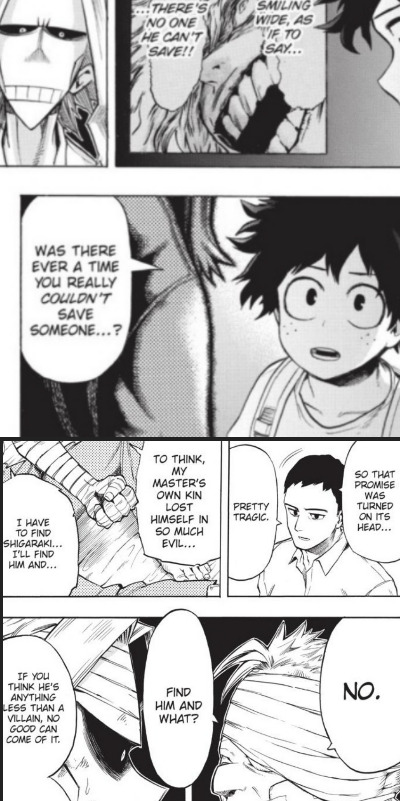
This isn't about the morality of All Might's actions, but rather the Jungian Symbolism behind them. You have All Might Say "I can Save Everyone", but inevitably there are people who All Might didn't or couldn't save. It's not that All Might is wrong for not being physically able to save everyone. It's that when confronted with the fact that there was someone who he could not save, not even just a stranger, but his master's grandson, All Might doesn't confront or seek out Shigaraki, instead he chooses to give up on him.
The shadow needs to be confronted in a Jungian plotline in order to be resolved. All Might, the great and powerful hero doesn't choose confrontation, but rather avoidance of the more complicated issue of Shigaraki's existence. In persona 3, 4, and 5 when you should "You're not me" at the SHadow, that starts a boss fight. This isn't about whether All Might's reactions were right or wrong, in a Jungian Story, running away from your shadow and not confronting it is not only impossible, it will only make the shadow grow worse.
So, Shigaraki is the shadow of All Might's tenure as the symbol of peace. Ignoring Shigaraki is so far a strategy that makes Shigaraki worse, and helps no one, especially when All ofr One comples into play. Because, All for One's entire thing is that he is the Dark Messiah.
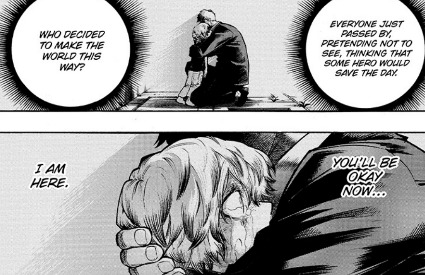
He specifically targets those who All Might did not save, and not only does he use this idea that the heroes also use that the reason you didn't get saved is because "you didn't deserve to get saved", because "you didn't want to be saved" he not only repeats the same rhetoric the heroes use to dismiss those who aren't saved by hero society, he uses it to manipulate the people on his side, not only by positioning himself as their savior, but also the only person who would have saved them.
As I said All for One is yet another Jungian Shadow to All Mght, by specifically targeting the people that All Might failed to save, and failed to even acknowledge like this. The role that One for All plays as the messiah of the common people and the good people, All for One plays as the Messiah for the villains, that no one else would bother to save so they better work hard for him they owe him now.
The point being that when All Might fails to confront his shadow like this, not only is he letting people who could have been saved much earlier not get saved, but he is also making All for One's job way easier. Those who are already in the palm of AFO's hands, what reason do they have to turn on him? The hero side has already given up on them. Get smashed by Stars and Stripes, or get possessed and used by All for One. Shigaraki's options are looking pretty great here. It's no reason why SHigaraki flashes back to that house over and over again.

He's not really free, even now. Sure, he's a villain who doesn't obey the laws in the strictest sense, but he's not really acting as his own person here, as long as Shigarki is continually rejected by society, he will always remain the shadow to society, over and over again, until he can become more than just a shadow and be his own person again.
Which is why All Might is being called to look more critically at his legacy, and we are shown an All Might ripoff, just straight up killing a guy. Just focusing on the heroes side of the story, just seeing the world in terms of heroes and villains, has never worked. I mean we already have two more foiling points in two other Jungian Shadows who aren't acknowledged.
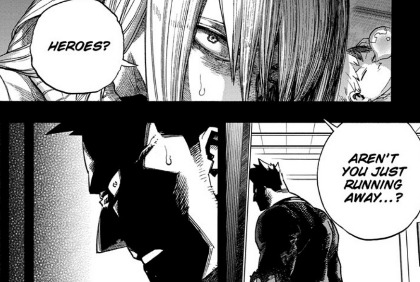
Rather than confront him we are shown once again a strategy of avoidance, not only does Enji not really want to see his villain son as a person, but he also spends about thirty chapters after receiving the love and support of his family NOT doing the thing he said he would doaut also there are thirty people right now who are dead who would never have died in the first place, if Enji hadn't sacrificed his whole family for herow ork. In Jungian terms, Dabi is the shadow that Enji fails to confront or accept, this is, rather obvious as Enji just yells "I KILLED THIRTY PEOPLE BECAUSE YOU WON'T LOOK AT ME DAD". This is paraphrasing of course, but not by much.
Rather than confront him we are shown once again a strategy of avoidance, not only does Enji not really want to see his villain son as a person, but he also spends about thirty chapters after receiving the love and support of his family NOT doing the thing he said he would do and tying to find Toya. The shadow / the ID monster has a simple role in the story,a s long as it's ignored, it's going to rampage. The more you ignore it, the more it yells for attention. Enji makes a public speech and fails to address his son, he tells his whole family he'll stop Dabi, and then ignores his other son, and uses another child as bait to go after Shigaraki, believing himself to be heroic the whole way through.
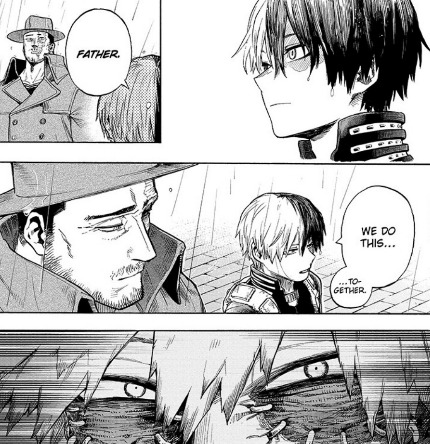
In strictly Jungian terms, it's because these people can't see themselves as anything other than heroes that we see them fail to realize their strictly unheroic actions, or the times they might be at fault for the fall of society. This is a pattern that even repeats with Uraraka and Toga, Uraraka tells Toga who is in the middle of a crisis that yes, she will be stopped if she continues to act out. But that's not the question she was asking. The question Toga wanted to know was will she be saved, and Urararaka, one of the most straightforwardly heroic characters in the story told her an answer that Toga interpreted as No. Uraraka wants heroes to be seen as people, but doesn't want to take the mental leap to see the villain just right in front of her, a girl her own age, as a person.
Which is where we get again to Stain's speech to All Might, that All Might wasn't a hero, and what made him strong wasn't his big flashy quirk, but rather his determination to save others even though it was hard. What makes All for One a strong power is not allt he quirks it has stashed up, but rather, because it was passed down from the first to the second, when the second came to save him even though he was the enemy of the world and the younger brother of All For One. It's a power that originated from people going above and beyond to save.
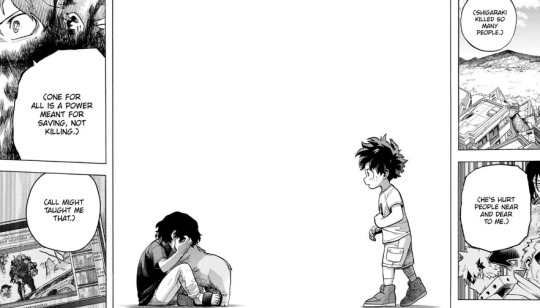
Because if there are no heroes, and no villains in the world, then there are just people suffering, and I'm going to close out on a quote from a TV SHOW I love, on why what matters more than the big flashy super powers, and the roles of hero and villain is how people treat each other. If there is no possible way to save everyone, then why does reaching a hand to Shigaraki Tomura and saving him matter?
Angel: Well, I guess I kinda worked it out. If there's no great glorious end to all this, if nothing we do matters... , then all that matters is what we do. 'Cause that's all there is. What we do. Now. Today. I fought for so long, for redemption, for a reward, and finally just to beat the other guy, but I never got it.
Kate Lockley: And now you do?
Angel: Not all of it. All I wanna do is help. I wanna help because, I don't think people should suffer as they do. Because, if there's no bigger meaning, then the smallest act of kindness is the greatest thing in the world.
Kate Lockley: Yikes. It sounds like you've had an epiphany.
Angel: I keep saying that, but nobody's listening.
All Might became a hero not for the glitz or the glory, but because he wanted to help other people, and that's the most important part. If you're going to redefine what heroes are, then it's good to remember heroes are heroes, not because they have powers, but because they reach out to help people. That's how a symbol of violence becomes a symbol of peace once more.
333 notes
·
View notes
Text
On Favorite Foods
Let's talk about how the smallest of details can show just how well Horikoshi can craft his characters. In this case just how much work he's put into creating Shimura Tenko.
Food is often used symbolically in media to convey something other than it's base nature, mostly because food does that outside of media. The food we eat and how we prepare it often has class, religious, and ethnic connotations; and to look at food historically is to traverse thousands of years of war, politics, and culture.
I'll use a small example first. We know Momo is wealthy because so many things about her are markers of wealth. Even more interestingly, compared to the traditional wealth of the Todoroki family, Momo's wealth is very much Westernized and that can be seen in how she interacts with tea. Her method and preference of tea is very different than the traditional love of matcha and tea ceremonies that some Japanese schoolchildren can take as extracurriculars. No, the way she drinks tea is very British-style, and this is bolstered by Gentle's mutual obsession with the same tea brands - he has a fixation over Anglo versions of gentility, as seen in his design. Momo then comes off as a 'lady'-like character. Not a traditional Yamato Nadeshiko, a term for the ideal 'Japanese' woman, but.. a Lady.
That's the more obvious stuff! But it's in throwaway things that I see Horikoshi's ingenuity.

This is Tomura's maternal grandfather serving him Ohagi. Tomura's been shown once or twice consuming sweets, so it makes sense that a five year -old version of him liked sweets the best. In this case he's fond of a very traditional sweet named Ohagi, or Botamochi.
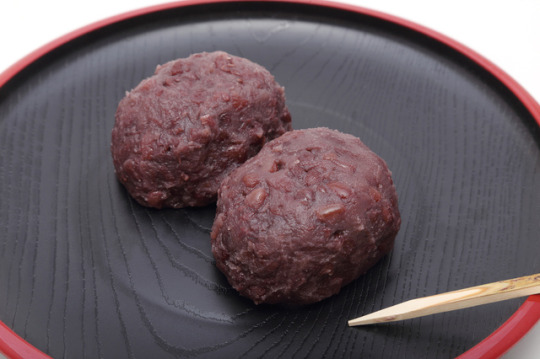
Ohagi is a sweet, sticky rice cake made by steaming and pounding rice flour and adding things like red bean paste to it (which according to color is what we see in this image). It's traditionally associated and eaten the most during the Spring and Autumnal equinoxes during a weeklong Japanese Busshist holiday named "Ohigan". This is a holiday primarily concerned with remembering ancestors and visiting memorials. Ohagi itself is bit more associated with the fall equinox than Botamochi.
So, as a food associated with Ohigan, what this means is that often Ohagi is offered as an offering to the dead on that week, and is eaten in memory of those who have passed.
Tomura Shigaraki is a character created of grief, death, and mourning. He literally wears/wore those he mourns throughout the manga. Don't forget that AFO bestowed the name Tomura out of the verb Tomurau; 'To Mourn For'. Shigaraki also contains death (Shi), while the Shi in Shimura is a homophone.
Digging deeper, Tomura's given birthday (if it's real) is 4/4. Most casual Western watchers might recall that four is considered a 'cursed' number in Japan because it can be pronounced 'Shi'. Thus his birthday, 4/4 is very much a reminder of death.
The dates of the Ohigan vary, but it's usually associated with the Chinese calendar and specifically a period of time named Chunfen (Shunbun in Japanese) that starts around March 20 and ends on the 4th of April, with the 5th usually being the first day of the new fiscal year as well. Endings, deaths - it's likely very few details are over looked when Horikoshi comes up something for a character close to his heart.
Just from a small dessert, we have such richness in seeing how Tomura was created as a character. So much of his concept and design revolve around mourning and death that even a small throwaway line of a favorite childhood sweet has meaning and characterization. This is where Horikoshi shines the most - in small details that end up giving a character so much depth.
910 notes
·
View notes
Text
Toga’s finally turning into a Villain, and what I mean by that is she’s realizing exactly what that the label entails - never having a normal life; irredeemable; lacking a future; not worthy of being saved; a person this society doesn’t need, just a beast in human skin. Heavy stuff. And she’s going to start thinking of herself as all this, which is the crux of the whole Villain thing.
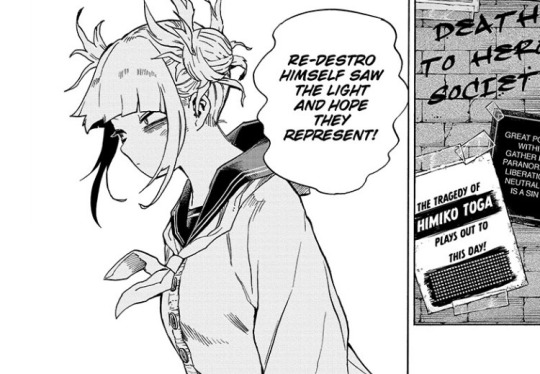
She’s always been shown focusing on the things she likes rather than the things she hates. So she found commonalities with Uraraka and Deku despite them being Hero-trainees. She joined the League because it gave her a place to feel more comfortable in her own skin. Her goals weren’t about destruction, even if she’s going along with Shigaraki’s plan; nor did she have a particular grudge against Heroes. Toga wanted to live a happy, easy life in a world that’s nicer, better to her than this existing one which has left her disowned by her parents, and everyone else.
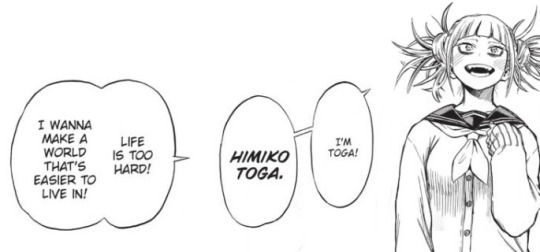
I think Toga still thought, somehow, she would grow up, find love, live her version of a normal life. She didn’t think about the full consequences and implications of the League’s actions. It’s naïve, but she’s 17, had been by herself since 15; she’s a still kid, like any other dumb teenager who thinks they’re at the pinnacle of growth and maturity, future vague and far away. Life was hard to live, but Toga was braving through. The League was going to change things, and besides, Izuku during the licensing exam said he’ll save anyone, no exceptions.
The League - except maybe Mr. Compress whose full deal we don’t know yet - are characterized by their profound disillusionment, of having nothing to lose when they joined, recognizing they’ve been completely kicked out of society and Heroes enforce that banishment.
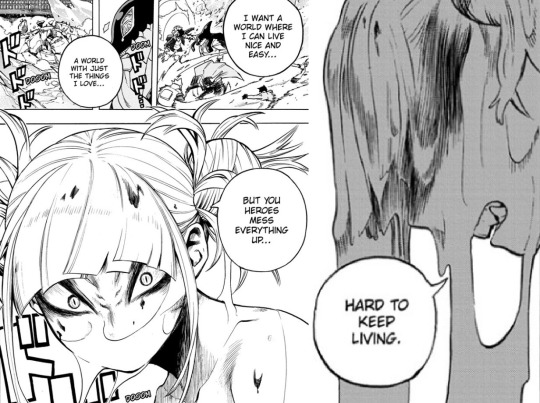
Until Jin’s death, Toga hadn’t experienced the full, overwhelming force of this; she held out hope, even if she wasn’t conscious of it. It’s why she reached out to Uraraka, as a last ditch effort to not fall into total despair. Toga needed to know if she still could have a place, a future, a life in society. What she got from the conversation was a firm ‘No’.

And now, she’s trying to comprehend the full weight of that ‘no’. It’s scary, believing life is only going to get harder and any effort is for an empty future. Good society has thrown her away completely and no one will help. She thought she was just another normal-as-could-be teenaged girl like Uraraka, but it turns out she’s not. Instead, she’ll continued to get hunted down by Heroes because to them, she’s not a person and they will kill her. Toga’s trying to accept this - once she does, Heroes have missed their chance, and it’s gonna be a lot harder to save her.
476 notes
·
View notes
Text
the heart of shigaraki tomura
i saw many different opinions on shimura tenko vs. shigaraki tomura, and the most are saying that they don’t want tomura to become ‘tenko’ again, because they’re afraid it would invalidate his experience as shigaraki. but the thing is that ‘shigaraki tomura’ is someone who afo created. shigaraki tomura isn’t his own person. ‘perfect’ shigaraki tomura in the way afo envisioned him isn’t fully a person at all - he’s an extension of afo. he’s someone who was moulded and groomed into being what afo wants - a mess of hatred, madness, pain, anger, - someone who doesn’t have a sense of self, afo’s submissive hollow shell to hold and house the man’s conscience. this persona and this name were imposed onto him.
‘but tomura is more than that!’ yeah, he is. you know why? shigaraki wasn’t created from nothing. he may be shigaraki tomura, but the foundation? shimura tenko? he never went anywhere. just like dabi is still touya, tomura is still tenko. but tenko IS a person. he cares for his friends, he’s angry about the injustice of this world, he’s funny, he’s smart, he likes to play videogames, he makes funniest faces, he’s determined, he hates his father and the way his family never protected him, yet he loved them, he feels sick when he kills people, he wants the world to change, he’s someone.
that’s why he screams ‘no’ and that’s why he remembers his childhood home where his own hatred began. because ‘shigaraki tomura’ afo wants isn’t someone who the person with that name really is or wants to be. accepting himself as shimura tenko wouldn’t invalidate anything, it would be finally shaking off afo’s expectations and visions for him and be able to be his own person and choose his own way
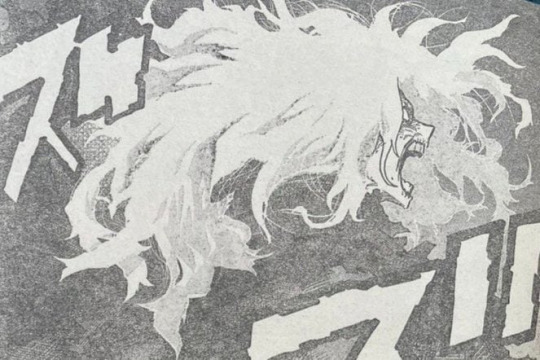
321 notes
·
View notes
Text
BNHA VOL 29 RE-READ :
Horikoshi is crazy for the way he made Endeavor tell Shigaraki to his face that he had no ideals, and then made Tomura remember Kotaro:
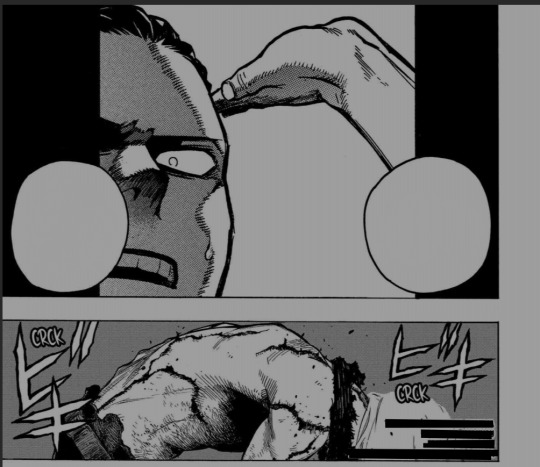
And not just that, immediately after remembering Kotaro, Tomura pushed himself over the top and he's body started to crack in an even worst way.
It was not the first not the last time a pro-hero decided to brush Tomura's words and physical condition aside, pushing him down with words and trying to kill him, giving AFO space to get a better grip at Tomura's body and mind:

His body starts to crack after Endeavor questions why Tomura is fighting for. See his hair, see the air coming out of Tomura's body, see his eyes.
What feeds Tomura's hatred is not just AFO. It's every time a pro-hero decides he deserve to die instead of listening to him. It's how people refuse to see him as a human being, rather seeing him as the embodiment of evilness.
Some chapters before, Mr. Compress had told Dabi to don't underestimate the heroes. It translates to don't underestimate what they can do but also to don't underestimate what their motivations.
The hero finally put to sleep a giant, and in an interesting parallel, we see how the heroes underestimate Tomura.
There's a lot to unpack in this chapter, including how Grand Torino almost (but doesn't ultimately) acknowledge that Nana Shimura and him made a wrong decision by leaving Kotaro behind. In this chapter we can already see Aizawa wishing for the heroes to kill Tomura, the beginning of his search for revenge.
But the next panel is really interesting to me:

Deku here is saying he won't forgive Tomura, while Tomura claims he can't forgive anyone.
This is so important.
Deku doesn't have to forgive Tomura to try and save him. Which means Tomura doesn't have to forgive the world to live among them. They can of course, Deku can forgive Tomura and Tomura can forgive society, but it's not required.
They only need to communicate.
If people finally decides to listen to Tomura, it'll reduce his hatred and rage. The same way, if people listen to Tomura, it'll help them understand why the villains have a valid point and why they are entitled to be angry and hate society.
I find in here more support to the theory of Tomura getting redeemed, thanks to Deku's help. During this whole fight, he sees more and more Tomura, until it culminates with Deku seeing Tenko as a kid, alone, sad, crying. In that moment, Deku gets a revelation and he decides to save Tomura, going against the vestiges and Grand Torino's believes.
I'm reading the Spanish translation right now so that's why I'm erasing the dialogues. Still, we get to see Tomura thinking that he can face anything if he keeps with him his heart, his ideals and his origins.
Could this be related to bnha 330? If Tomura keeps Tenko in his heart, if he still dreams of being a hero and if he still believes in his own ideals, and not AFO's ideals, he's always going to have a change to overcome AFO and get redeemed.
His not too far gone.
Deku while fighting Tomura was in the same mentality of Uraraka and Shouto said after facing Toga and Dabi.
I will stop them.
Not kill. Stop them.
This is all I have for this chapter. I'm re-reading a lot and I'm really enjoying it, because I have a terrible memory and there are many details I forgot already.
I'll be writing more (meta? Don't know) posts about bnha as soon as I can, 'cause I've been kinda busy with college).
250 notes
·
View notes
Note
At this point why do you think bakugou still wants to be number 1? It serves no real purpose and if the series is saying the rankings are bad, then there’s no reason for anyone to take this seriously sense it’ll either not be be a thing or not actually matter anymore. Is it simply something to motivate him to be stronger despite the title meaning nothing? Or is this going to be the final lesson Bakugou is going to have to learn as a character since that desire to be number 1 is the only thing he still has from where he was at the start
I think No 1 does not necessarily mean the hero rankings, but also it’s not a bad thing to strive for in itself.
The narrative clearly established that one of the worst things of the All Might era was the passivity it perpetuated among the heroes, who felt like they were not competing in the same field so they stopped trying as hard. And even in the case of Endeavor who was the only exception, the problem was never that he wanted to be No. 1. (that was actually a positive thing), but rather that he gave up very fast and tried to achieve his goal in unethical ways and pushing his related psychological issues onto his family.
In Bakugou’s arc, similarly, his ambition is not a bad thing in itself. The question is the “why” and the “how”. As a middle-schooler, he wants to be No. 1 because he feels entitled to it on account of his exceptional quirk. After DvK, it is about his wounded pride, it’s all about seeking external validation.

Already at the time of the Sport Festival, his public declaration is a way to push himself, a motivator. What is problematic is his attitude towards the others, seeing them as mere stepping stones, people to look down on.

We also learn during the Sport Festival together with Bakugou that someone giving their best is a sign of respect, and all the external validation in the world doesn’t mean anything if there is no internal validation to match it. The world can’t tell Bakugou that he’s the best, unless he himself FEELS it. So he does know quite early on that an external No. 1. ranking is not the same as truly being the No. 1.


Post DvK2, the immediate thing Bakugou does (in response to All Might saying again it’s not his fault) is to recognize Deku as a rival. Kacchan’s going to keep pushing himself, because remember, it’s a sign of respect - but what changes is that he doesn’t view Deku as a stepping stone anymore, but someone to “lift” up in the process. He starts to see and use rivalry as a tool for growth for both of them - take the fear of inferiority and turn into a positive motivator.
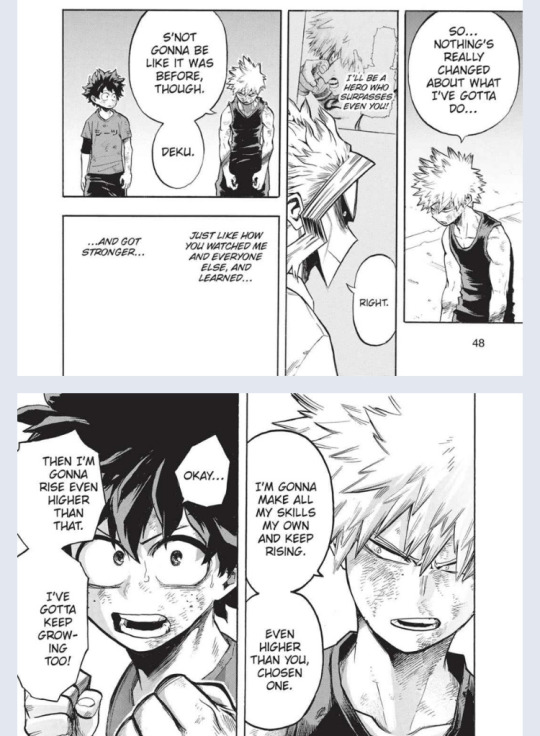
So as Bakugou gets himself into his rivalry thing with Deku and tries to figure out his own weaknesses and Deku’s strengths, it becomes clear to him that what No 1. means is more than just a strong quirk. There are ways the weak can be strong and there are weaknesses even the strongest quirks can’t spare a person from.
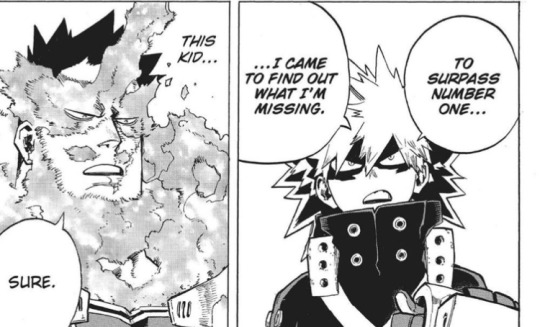

So yes, saying that he wants to be No 1. is in a way the same as his original character motivation, it has a very different meaning, just as Kacchan is a very different person than he was a year ago.
- I think he views No 1 as something that can’t be just an external trophy, but something he earns for himself by doing his best
- Still aiming for No. 1. is a sign of respect - Deku may be as strong or stronger than All Might eventually, but Bakugou went up against All Might, experienced the power gap and smiled. It did not make him despair, it made him feel fired up.
- He understood that strongest is much more than just a question of the strongest quirk. There are many ways to be strong, and by recognizing the strength Izuku had back as a quirkless child gave him new understanding and more ways to grow than just making bigger booms.
- Regardless of strength of quirk, they are all on the same field, because heroism in the end at its core is recognizing what the right thing to do is and acting on it. It’s not a question of power only. So this evolved Bakugou recognizes everyone as his rivals, because where he once saw everyone as stepping stones, now he sees the potential in everyone and wants to motivate and lift them up through the rivalry.

So I feel like this scene wasn’t meant to show that Bakugou was stuck in the past, but that even if his goal seems to be the same, it has taken on new layers and meaning in light of his growth. Wanting to be No 1 was never a bad thing - but the way he changed, now Kacchan wants to do it for the right reasons (to save people) and the right way (keep rising and lifting everyone with him)/
(The narrative did a similar thing with Todoroki in the same chapter, who was also tied back to his starting point of not wanting to be like Endeavor, but again, doing it the right way, for the right reasons.)
99 notes
·
View notes
Note
Out of curiosity, do you think Twice’s death will be brought back into the narrative considering the set up of the scene? HK made it look pretty important , and it’s just weird for it be brushed aside by Hawks saying in the conference “I apologize, there was no other way.”
Hey there! Thanks for waiting for my answer.
So, I absolutely think Twice's death will be brought back into the narrative. The reason why his death didn't seem to matter to anyone in the immediate aftermath is because frankly, society's negatively biased views towards villains haven't changed… yet. Their views on heroes have done a 180 thanks to a combination of being repeatedly let down by Endeavor and other heroes, the Dabi reveal tape, and Ochako's speech to the UA refugees, but there hasn’t been a widespread attempt at reframing people’s attitudes towards villains.
BUT! We’re seeing a glimpse of this through the UA kids. Shouto started calling Dabi 'Touya' and 'Touya-nii' after realizing the villain was his brother, and even empathizes with his anger. Deku recognizes that Shigaraki is destroying because he's a deeply hurt child, and Ochako is on the cusp of extending her "we all deserve to smile" belief to Toga too, who she last saw running away in tears.
It makes sense no one cares about Twice's death - yet. Twice was a nobody in the eyes of society, and it is fitting that even in death he's a nobody. After all, this is the League's complaint about society: that people like them are ostracized as second-class citizens and deemed worthless; society keeps proving this repeatedly by not caring about Twice's death. The public wouldn't just start caring that a hero killed a villain, who they never really saw as people to begin with, when they're scared out of their minds about Shigaraki and AFO and the escaped prisoners. They don't approve of heroes anymore anyway, so it's just another drop in a bucket of water. If Hawks had killed a hero (a “good” victim) maybe that would have been different, but we saw the public question Dabi’s claim that Best Jeanist was killed by Hawks and they seemed satisfied with the answer and let the subject go. The bottom line is that society still views villains as “bad” victims.
However, I do think the story is working towards changing this attitude about villains, and Twice’s death was a set up for this in the long run. The fact that Hori dedicated a whole chapter to Twice's death and his dying thoughts is indicative that it's important and that it'll come up again. Let's compare his death to another known death - Midnight. Her death happens off-screen because it wasn’t HOW or WHY she was killed that mattered, but WHO found her and WHAT impact it had on them, how it will change their views of heroism.
With Twice, WHO killed him is important because of Hawks’ hero title. Heroes are held to a higher standard and don't kill, but he did anyway. Even WHO was present when Twice died is important. Dabi was there, Hawks was there… The only other person who saw Twice’s body was Tokoyami, and Tokoyami keeps making appearances in the manga citing his grievances that Hawks won’t return his calls. Not to mention Dabi asked Tokoyami some loaded questions that have gone unanswered:
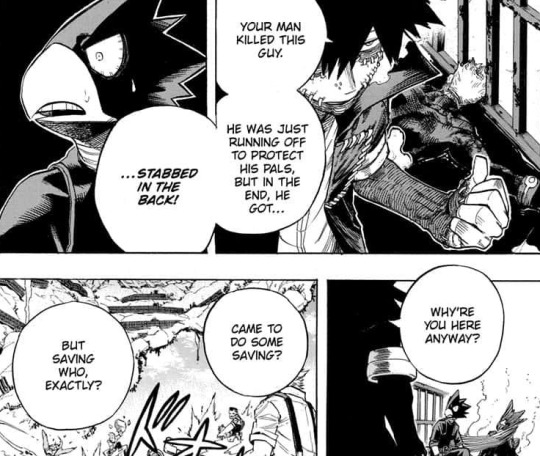
Tokoyami responds evasively by saying he was worried about his mentor, but you can clearly see the look of horror and shock on his face, who is usually stoic and careful with his words. I think Dabi reached Tokoyami by humanizing Twice, who was just some guy going to save his friends because they were being ambushed, much like Tokoyami is doing right now and has done before. Also, it's significant that the background of Dabi's speech bubbles are of the chaos that heroes caused by raiding the villains first. When you look at this scene objectively without hero or villain labels, who is the offending party and who is being attacked? I think Tokoyami may have thought of this, too.
Also, you may be thinking, "What the f does Tokoyami have to do with Twice?" Well, I think they're indirectly linked because villains and heroes are two sides of the same coin. I bet we'll soon find out why Tokoyami is so pissed off at Hawks, and I bet it's the same reason Bakugo and Shouto were put off: because their mentors are letting them down, avoiding them. The various heroes they once looked up to aren’t so perfect and flawless, and maybe their way of approaching heroism isn’t the only correct one. Hawks was someone who inspired and motivated Tokoyami, but now he's effectively ghosting him and acted un-heroically by killing. Considering the theme of the new generation of heroes surpassing the older generation, it seems like Tokoyami will recognize that the hero he looked up to was wrong and he must act differently than his mentor.
And okay, yeah, the argument could be made that Tokoyami reassured Hawks that he "did nothing wrong", but much like Deku's "I won’t ever forgive you” to Shigaraki, I think these were thoughtless knee jerk reactions to their life-or-death situations. They’ve since had time to reflect, and we’ve since seen that Deku changed his mind.
Another argument that could be made is, "Well why is it taking so long for Twice to matter?" to which I say that we have to keep in mind that the characters who cared about Twice haven't gotten screen time, so that's another obstacle in the way of addressing Twice’s death, among numerous things like not one citizen calling out Hawks more for killing at all, or Endeavor for abusing his family. It’s just wonky framing and scene sequence. Also, it’s difficult from a reader’s POV to gauge just how well the arc is going when we’re only reading a chapter at a time. For example, those who were reading the war arc often felt like the pace was uneven and the plot moved slowly, but others who read through it because the chapters were already out say the opposite.
Like, we're getting a chapter a week, and it's nearly been a year since the Dabi reveal and we still don't know exactly what the Todoroki family means by "stop" Dabi. Apparently some readers take this to mean Endeavor has to kill his son and Shouto has to kill the brother he can relate to the most. So, like the ambiguity surrounding the Todorokis, the Twice situation is in the same boat for now. I'm not saying it's the best pacing or best choice on the author's part, by the way – I’m just saying Hori probably has more up his sleeve. He is struggling to balance all the characters and storylines he has, but he is addressing each thing slowly.
ANYWAY. I hope these words are coherent. Thanks for such a great question!
76 notes
·
View notes